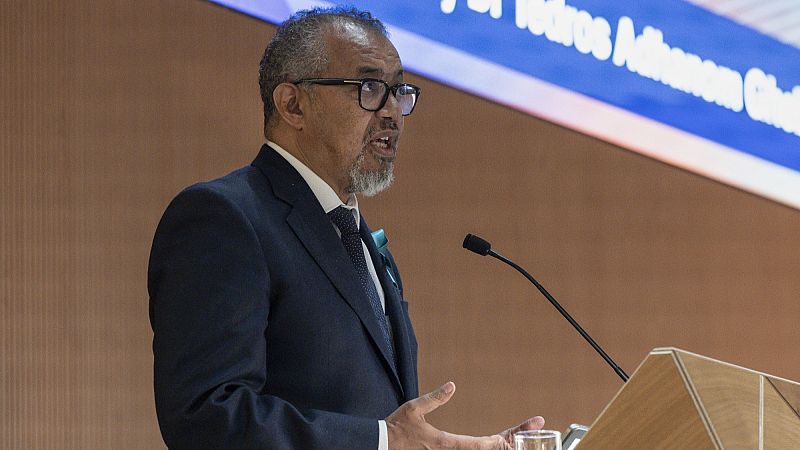
Stripped of US funding, the World Health Organization (WHO) chief asked member countries to support its "extremely modest" budget request by comparing it to the cost of war or outlays for ad campaigns for tobacco.
After nearly 80 years of striving to improve human lives and health – which critics say it has done poorly or not enough – the United Nations health agency is fighting for its own after US President Donald Trump halted funding from the United States, which has traditionally been WHO’s largest donor.
The WHO wants $4.2 billion (€3.7 billion) for its next budget cycle, equating to $2.1 billion per year (€1.8 billion).
The annual sum is "the equivalent of global military expenditure every eight hours," WHO chief Dr Tedros Adhanom Ghebreyesus said.
"And $2.1 billion [€1.8 billion] is one-quarter of what the tobacco industry spends on advertising and promotion every single year. Again, a product that kills people," he told the WHO's annual assembly in Geneva.
"It seems somebody switched the price tags on what is truly valuable in our world".
Tedros made no specific reference to the US cuts but has said previously that the pullout was a "mistake" and urged Washington, which did not send a delegation to the assembly, to reconsider.
WHO has presented a budget for the next two years that is 22 per cent less than originally planned, largely in response to US and other Western funding cuts, and says it has landed commitments for about 60 per cent of that.
But it still faces a budget gap of $1.7 billion (€1.5 billion).
"We know that in the current landscape,** mobilising that sum will be a challenge," Tedros said,** though he called the request "extremely modest" given the organisation’s on-the-ground work in 150 countries.
Cuts that could cost lives
As a result of the cuts, the WHO has seen a plunge in its ability to carry out its sweeping mandate to do everything from recommend reductions in sugar levels in soft drinks to head the global response to pandemics like COVID-19 or outbreaks like polio or Ebola.
Tedros and his team have been grappling with a response to the US cuts as well as reduced outlays from wealthy European countries that are worried about an expansionist Russia and are putting more money toward defence, and less toward humanitarian and development aid.
Matthew Kavanagh, the director of Georgetown University's Center for Global Health Policy and Politics in the US, said other countries have used the US cut in aid "as cover to do their maneuvering, with many countries in Europe reducing aid".
"Literally millions will likely die needlessly on the current trajectory, and the world’s health ministers do not seem capable of a coherent response," Kavanagh added.
Management shake-up as critics blast WHO
Trump has long derided WHO, including back in his first term when he pulled the US out over its alleged kowtowing to China and other alleged missteps in the COVID-19 pandemic.
After former President Joe Biden reversed the decision, Trump again said he would withdraw the US from the organisation on his first day back in office in January.
Other opponents continue to lash out at WHO.
CitizenGo, an activist group that supports right-to-life and religious liberty issues, protested Monday outside the UN compound in Geneva where WHO's meeting was taking place.
The rally included an image of Tedros and billionaire Microsoft co-founder Bill Gates, a major WHO supporter, shaking hands while surrounded by dollars.
In the run-up to the assembly, WHO has been cleaning the house and cutting costs.
At a meeting on its budget last week, Tedros – a former Ethiopian health and foreign minister – announced a shake-up of top management that included the exit of key adviser Dr Michael Ryan from the job as emergencies chief.
Tedros said last week that the loss of US funds and other assistance has left the WHO with a salary gap of more than $500 million (€440 million).







